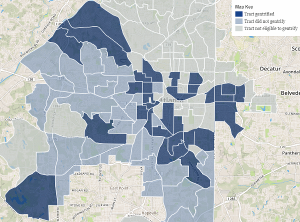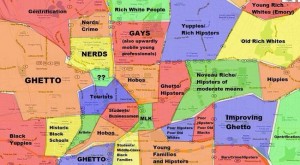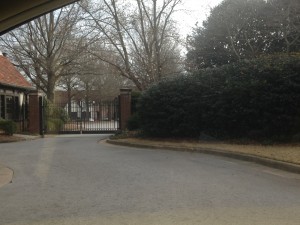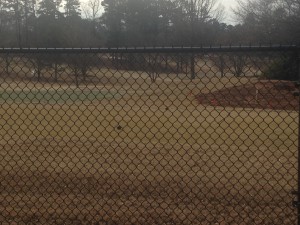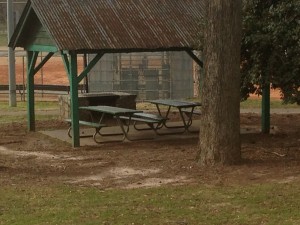Atlanta’s Gated Getaways: Open to All; Closed to Some
Atlanta’s Gated Getaways: Open to All; Closed to Some!
Atlanta has some of the most beautiful and relaxing places to ever witness, yet not everyone will be able to experience them all. I have only been in Atlanta for less than a year, and in this one year I have not been able to do everything there is to do even if I wanted to, but I have been able to go places that I would have never imagined even existed, but even my close encounters, I realize that not every place is for everyone!
Well, here is my take, many people have moved to Atlanta for various reasons, including fashion careers, acting jobs, the music industry, the history of Atlanta, the urban environment and of course the hot topic, “Gentrification” which is “the process of renewal and rebuilding accompanying the influx of middle-class or affluent people into deteriorating areas that often displaces poorer residents.” (Webster) But for whatever reason, Atlanta has become the place to be for people of all races. Even though there are diversified groups of people in Atlanta. One thing that many people don’t know is t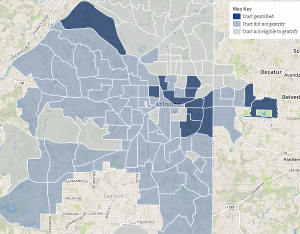 hat, Atlanta is segregated in certain parts with certain people.
hat, Atlanta is segregated in certain parts with certain people.
Here is a map that shows Atlanta’s division of people. While it may not be accurate with terms, it sure tells a story. Though we don’t always intentionally draw these lines, we help distinguish them by where we shop, where we eat, the places we go, and most importantly the places we don’t go. But of course, there is also a thing as “built environments”.
Architectures have a job and their job is to create and design functional buildings and places that serve whatever purpose is needed. Now, the question is: are some of the designs meant to keep people out: exclusion? That is the million dollar question. I would say yes. Through design, policies and requirements, this is what creates inclusion as well as exclusion. During my down time, when I can get away from my responsibilities and enjoy just a little bit of relaxation, I like to explore out into Atlanta’s attractions. Yes, I am a person who loves my relaxation. There is so much to do in Atlanta, I could go on new adventures every week, while I have ventured out, I have managed to see two brilliant locations, the Aquarium, the High Museum of Arts. These were beyond amazing and for myself quite refreshing. But one of my favorites by far has been the Chattahoochee Coffee Company. Such a serene and beautiful place off of the river, in a gated community, but still accessible to the public.
There is also one that I can only wish to enjoy due to my love for mini golf, The East Lake Golf Club. Why would that be? Well, But remember when I said, not every place is for everyone. This partially what I am referring to. You see, while many places welcome the public, or all people. Some places, like the Eastlake Golf Club, does not. Even though the East Lake Golf Club rests in the East Lake Neighborhood that in recent years, went through gentrification. During these times, Tom Cousins and a few of his supporters went through the East Lake Neighborhood and did a complete makeover. They tore down the apartment housings and replaced them with beautiful homes, brought more jobs, better education and child care to the area.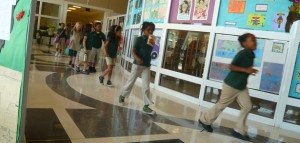
Many people can attest to the difference that this transformation had on their lives and living conditions. While some people were allowed to remain within their neighborhood, many were not. You see, this was a neighborhood of crime, usually referred to as “Little Vietnam”. Even police officers were afraid to take calls here. Between the drug infested streets and low poverty living. I recall reading the “The Big Discussion With Gentrification in Atlanta” article and I remember the interview that took place with Tom Cousins, and other investors who helped clean up the neighborhood. The mission was to bring about a change, completely transform the neighborhoods. This is exactly what they did and while they may have very well did everything that they did with GREAT intentions for us all, not everyone benefitted from this transformation. Many testimonies were given in regards to East Lake Neighborhood before and after the changes. One person in particular was Travon. He discussed his views on how gentrification erased the historical and sentimental meaning of the black culture in those neighborhoods, by mixing them or completely taking them over making them unrecognizable to what some used to call home. In regards to erasing the history built, the thing that was even more less fortunate was that lots of people weren’t able to return back to their homes after the neighborhood transformation. These new homes now had really strict guidelines as to who can stay in these homes, the kind of income they must have, drug tests of course, which I actually approve of, but overall this left many people homeless with no place to return. Imagine that.
East Lake Neighborhood is also home to the newly renovated and thriving Golf Club. The East lake Golf Club sits in the middle of the neighborhood now. When I first signed up to observe and do a built environment description the Golf Club I was very excited due to my love for golf. (I am no Tiger Woods, but I enjoy it like no other). Well, to my dismay, upon arrival to the golf course, I was met by a closed off gated community with a very strict gate attendant who not allow me to enter due to membership purposes and of course, I a person, who looks nothing like a golfer or anyone who would a membership through any major corporation was denied access. This took me by complete surprise, I was really liking forward to getting on the other side of that gate. But unfortunately, even though it sits in the heart of East Lake neighborhood, where right across the street is a spiraling down-hill playground full of people of color, this golf course was not for people like us. My first thought was, well why have it here? Here where we all can see it from the backyards of our homes, our children can witness from this trash filled, paint peeling playground and see the nicer things such as a PGA tour stop golf course and will probably never get the chance to enjoy it, as a child and possibly as an adult.
As I sat around, I teased myself by walking back and forth as I watched two upper class white men through the holes in the gate. They really seemed to be enjoying themselves on this particular Sunday morning, until I was caught staring. I felt embarrassed and further more as if I did not belong. I slowly backed away and sat in my car alongside the road to record everything that I had witnessed, the emotions I felt and everything that I could remember seeing through the gates before I made the golfers feel uncomfortable as well as I. all I can remember saying is “wow, this is beautiful and the grass is soo nurtured”. I knew that that place was a place for the elites and upper class people who could afford their membership through the positions they held. And I remember looking directly behind me, and seeing a park filled with African American children running and playing in a park that in comparison to the Golf Club was not fair, but it was all that they had.
Being in the midst of the Golf Course was an experience all by itself. But I was so refreshed when it was time to choose another environment, the Chattahoochee Coffee Company. Now, I cannot say that I was not disappointed when I did my research and found out that I had yet selected another gated community. (Big sigh) but the fact that I, and people of all races, and social classes would be allowed regardless of anything demo-graphical about me was a great relief.
During my built environment observation time, I had the pleasure of observing the Chattahoochee Coffee Company, as I mentioned before. This was by far one of the greater and relaxing times I have had since living here in Atlanta. Chattahoochee Coffee Company is located off of Akers Mill Road in the Walton Community Apartments. The apartments themselves are beautiful and freshly renovated. It is a gated community that you must dial in to before you can access the Coffee House on the river. It was the most serene place to be. I have now made this my little relaxation spot that I like to revisit through the week. Due to it being closed to the public on the weekends, which I personally did not mind at all, their public hours through the week are sufficient enough: meaning they are open five days out of seven which is pretty impressive and for that I am grateful. I sat here for hours taking in the breeze in the morning and the sun in the later afternoon.
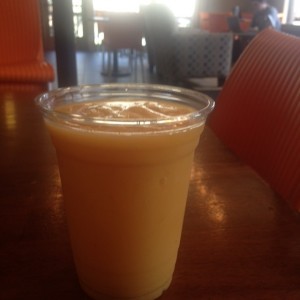 As I sipped my peach mango smoothie, I observed my surroundings which was filled with a diversified group of people alongside the river. This made me feel very welcome. There was a family walking along the river with their newly walking baby, a couple of college students huddled together studying, an African American guy listening to music as he read a book, and etc. The coffee shop attendees were very pleasant and made sure that everyone was comfortable and received the best service you could have asked for. I was very pleased with the environment. I just would have never imagined something so serene, I would have access to.
As I sipped my peach mango smoothie, I observed my surroundings which was filled with a diversified group of people alongside the river. This made me feel very welcome. There was a family walking along the river with their newly walking baby, a couple of college students huddled together studying, an African American guy listening to music as he read a book, and etc. The coffee shop attendees were very pleasant and made sure that everyone was comfortable and received the best service you could have asked for. I was very pleased with the environment. I just would have never imagined something so serene, I would have access to.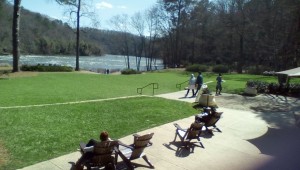
As you see, the Golf Club and the Chattahoochee Coffee Company were like night and day for me. While they are both great attractions, as well as many others in Atlanta, some of us aren’t lucky or privileged enough to experience them both or all.
Sources:
Max Blau. “Creative Loafing.” Can Anyone Stop Atlanta’s Gentrification. 13 Feb 2015. Web. 04 Feb 2016. http://clatl.com/freshloaf/archives/2015/02/03/can-anyone-stop-atlantas-rapid-gentrification.
“PBS Newshour.” Chasing the Dream: Poverty and Opportunity in America. PBS, 09 May 2015. Web. 22 Feb 2016. http://www.pbs.org/newshour/bb/can-u-s-break-clusters-poverty-roiling-south/.
Garland, Sarah . “The Atlantic .” Rich Kid, Poor Kid: How Mixed Neighborhoods Could Save America’s Schools. The Atlantic, 25 Jul 2012. Web. 28 Mar 2016. <http://www.theatlantic.com/national/archive/2012/07/rich-kid-poor-kid-how-mixed-neighborhoods-could-save-americas-schools/260308/>
“An Atlanta Neighborhood Tries To Redefine Gentrification.”Frontiers of Race, Culture and Ethnicity. Code Switch, 23 Sep 2015. Web. 04 Feb 2016. <http://www.npr.org/sections/codeswitch/2015/09/23/435293852/an-atlanta-neighborhood-tries-to-redefine-gentrification>.
